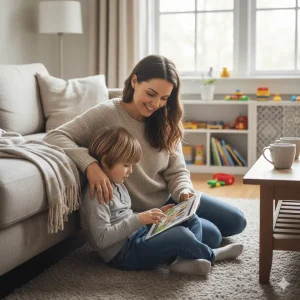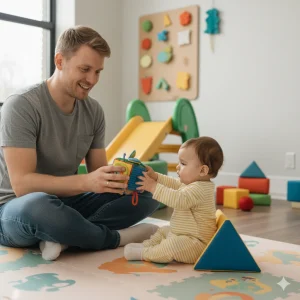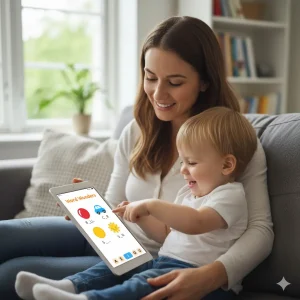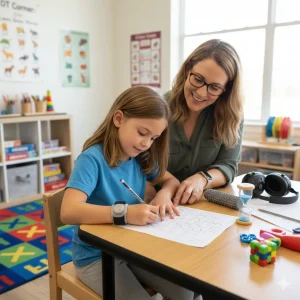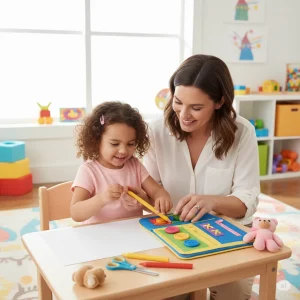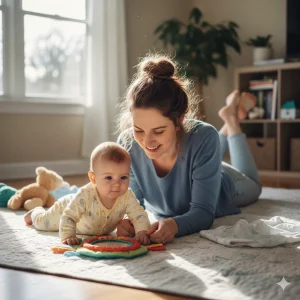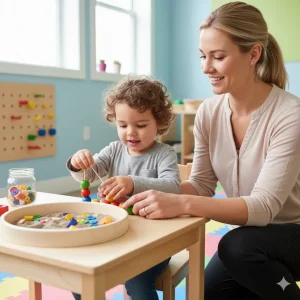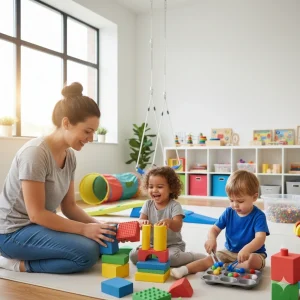Toddler Only Uses Memorized Phrases? What That Might Mean
By Wellness Hub
Last Updated: July 15, 2025
Have you noticed your toddler repeating the same lines from cartoons or books over and over? Maybe they always say the exact same sentence when asking for something, instead of using their own words. This can feel confusing—and maybe even a little concerning—but you’re not alone.
Some toddlers repeat the same phrases or only use memorized speech as a way to communicate, especially if they’re still learning how to form their own sentences. This is called scripting.
Scripting is when a child uses exact phrases they’ve heard before—like a line from a favorite show, a song lyric, or something you’ve said. For example, instead of saying “I want water,” they might say, “Do you want some juice?” because that’s what they’ve heard often.
At certain stages of development, this can be totally normal. Repeating what they hear helps toddlers learn the rhythm and structure of language. It’s often a part of early speech development and usually fades as they grow and start forming their own thoughts and words.
But if your toddler is only using memorized phrases and isn’t starting to use new words or sentences by age 2.5 or 3, it could be a sign they need extra support. You might also notice that:
- They use the same sentence in different situations.
- Their speech doesn’t match what’s happening around them.
- They repeat things out of context, or without back-and-forth conversation.
Why Does My Toddler Repeat the Same Phrases Over and Over?
If your toddler keeps saying the same things on repeat—like quoting a cartoon line or using the same sentence every day—you might be wondering: Why do they do this? – The answer often lies in something called echolalia.
What is Echolalia in Toddlers?
Echolalia is when a child repeats words or phrases they’ve heard before, either right away or later on. It’s a common part of early speech development, especially in toddlers who are still learning to talk.
There are two types of echolalia in toddlers:
- Immediate echolalia: Your child repeats something they just heard. For example, you say, “Do you want a snack?” and they reply, “Want a snack?” instead of answering yes or no.
- Delayed echolalia: Your child repeats something they heard earlier—maybe hours or even days ago. For example, they might repeat a line from a cartoon while playing, even if it doesn’t match what’s happening.
For some toddlers, this is a way to practice language. They’re trying to make sense of the words they hear and how to use them. But when echolalia in toddlers continues beyond age 2.5–3 without much spontaneous speech, it may be a sign they need more support in learning to use language for real communication.
This pattern is often referred to as toddler speech scripting—when children rely on repeated, memorized phrases instead of their own words to express needs or ideas.
Common Reasons for Scripted Speech in Toddlers
There are a few possible reasons why a toddler might use scripted speech or repeat the same phrases often:
1. Speech or Language Delay
Toddlers with a speech delay may not yet know how to create their own sentences. So they use phrases they’ve memorized to try to communicate. This is one of the early speech delay signs in toddlers, especially if they have a limited vocabulary and rarely use original language.
2. Autism Spectrum
Scripting and echolalia can also be common in toddlers on the autism spectrum. It doesn’t automatically mean your child has autism, but if they often repeat phrases out of context, avoid eye contact, or struggle with social interaction, it’s worth exploring further with a professional.
3. Sensory Processing Differences
Some toddlers use repetition or scripting as a way to self-soothe or manage overstimulation. Hearing familiar words in a set pattern can be calming, especially in new or noisy environments.
Signs Your Toddler May Need Speech Support
Every child develops at their own pace—but if your toddler is mostly repeating phrases and rarely using their own words, it might be time to take a closer look. Some signs are part of typical development, while others may point to a speech or language delay.
Let’s look at a few key red flags that could mean your toddler needs speech support.
Red Flags to Watch For
By the age of 2.5 to 3 years, most children start to combine words, ask questions, and express thoughts using their own language. If your toddler is mostly repeating memorized phrases and not creating original speech, that’s something to keep an eye on.
Here are some common speech red flags in toddlers:
- Not using their own words: If your child mostly repeats things they’ve heard and doesn’t try to say new or different things, it may be a sign of a speech delay.
- Uses phrases out of context: For example, they might say, “Let’s go to the zoo!” when you’re just eating dinner—because they’re recalling a favorite cartoon or memory.
- Only mimics what they hear: Instead of answering questions or expressing needs, your toddler simply echoes what you say. If you ask, “Do you want juice?” and they respond with, “Want juice?” without meaning behind it, they may be relying on imitation.
- Limited vocabulary: By age 2.5 to 3, toddlers should have a growing list of words and simple sentences. If they stick to just a few memorized phrases, it may be time to seek help.
It’s not just about how many words they use—it’s about how they use them. If your toddler isn’t using speech to communicate their own thoughts or needs, it’s worth checking in with a professional.
When Repetition Is More Than Just a Phase
All toddlers repeat things—it’s part of how they learn. But how do you know when to worry about your toddler repeating phrases?
Here are a few clues that the repetition might be more than a temporary phase:
- The repeated phrases don’t match the situation.
- Your child seems to “memorize and recite” but struggles to answer simple questions.
- Repetitive speech continues well past age 3 without progress toward original speech.
- There’s little or no back-and-forth conversation.
In these cases, repetition may not just be playful or developmental—it could be a sign your toddler is having trouble with language processing or expression.
Does This Mean My Toddler Has Autism?
If your toddler is constantly repeating the same phrases or quoting lines from cartoons, you might start to wonder: Could this be a sign of autism?
It’s a common question—and an understandable one. Many parents come across the term “echolalia” or “scripted speech” while researching their child’s language habits and see it linked to autism. But let’s take a moment to break it down gently and clearly.
Echolalia Doesn’t Always Mean Autism
It’s true that toddler memorized speech is often mentioned as one of the signs of autism in toddler speech. Many children on the autism spectrum use repeated phrases as a way to communicate, especially when they find it hard to come up with their own words.
However, echolalia in toddlers is not always a sign of autism. Some children use repeated speech as a step toward learning language. They’re still figuring out how to form sentences and may rely on familiar phrases to express themselves.
So what’s the difference?
It often comes down to context and interaction:
- Is your toddler using phrases to connect with others or just repeating them to themselves?
- Are they understanding and responding, or just echoing?
- Do they show other signs, like avoiding eye contact, difficulty with play, or limited social interaction?
These extra signs—especially when combined with memorized speech—can sometimes point toward autism, but not always.
Only a Professional Can Diagnose Autism
It’s important not to jump to conclusions or self-diagnose. The signs of autism can be subtle or overlapping with other developmental differences like speech delay or sensory challenges.
If you’re noticing ongoing repetition, a lack of original speech, or other signs that concern you, the best next step is to talk to a qualified professional. A speech-language pathologist or developmental pediatrician can assess your child’s overall development and guide you clearly.
At Wellness Hub, we support parents through this process with expert online speech therapy and early developmental screening. You don’t have to go through this alone—whether it’s autism, a speech delay, or just a late bloomer, we’re here to help you understand what’s going on and what to do next.
How to Help a Toddler Who Only Uses Memorized Speech
If your toddler mostly repeats lines from cartoons or uses the same phrases every day, you might be wondering how to help them use more natural, original language. The good news? There are simple, everyday ways to gently guide your child toward spontaneous speech—right at home.
Here are a few easy, research-backed strategies that can boost toddler speech and help them move from repetition to real conversation.
Talk, Pause, and Give Time to Respond
One of the easiest ways to help is to simply talk more—but in a slow, clear, and natural way. Toddlers who use scripted speech often need extra time to process what they hear and think of a response.
Try this:
- Talk slowly and use short, meaningful sentences.
- Pause after you speak, giving your child 5–10 seconds to reply. This wait time is powerful—it shows them that their voice matters.
- Celebrate any effort they make to use their own words, even if it’s just one or two!
This patient approach can make a big difference in how to teach spontaneous speech to toddlers. Repeating back what they say, then expanding it with new words, also helps model natural conversation.
Use Play to Encourage Spontaneous Speech
Play is where language comes to life for toddlers. If your child is stuck in scripting, play can be a powerful way to spark real, meaningful speech.
Here are some speech activities for toddlers that encourage original language:
- Pretend play: Use dolls, cars, kitchen sets, or animal toys to act out simple scenes. Narrate what’s happening: “Uh-oh! The bear is sleepy. Let’s tuck him in.”
- Sabotage play (in a gentle way): Give them a toy with a missing piece or a snack they can’t open. This encourages them to ask for help using their own words.
- Sing interactive songs like “Wheels on the Bus” or “Old MacDonald,” and pause to let your toddler fill in the blanks.
The key is to make play time fun and pressure-free. These activities help toddlers move from repeating what they’ve heard to using their words in the moment.
Avoid Asking Too Many Questions at Once
We often ask toddlers lots of questions—“What color is this?” “What’s that animal?”—but for a child who’s learning to speak, too many questions can feel overwhelming.
Instead:
- Focus more on commenting than questioning. Say things like, “That’s a big red truck!” rather than “What color is that?”
- When you do ask a question, keep it simple and give time to answer. Open-ended ones like “What happened next?” can encourage more original speech.
When to Talk to a Speech Therapist
If your toddler is over 2.5 and still mostly uses memorized phrases—or repeats what they hear without forming their own sentences—it may be time to consider speech therapy for toddlers.
Every child develops differently, but there are some signs that suggest a child could benefit from speech development support. These include:
- Repeating the same lines or phrases with little variation
- Struggling to answer simple questions with their own words
- Not using language to express wants, needs, or emotions
- Using mostly scripted speech without trying new words
It’s not about how much your toddler talks—it’s about how meaningful and flexible their speech is. If they’re not using language to connect with others, ask for things, or respond in context, they may need extra support to build those skills.
The earlier you seek help, the better. Early speech therapy can:
- Build a strong foundation for communication
- Boost confidence and reduce frustration
- Help toddlers move from copying to creating their own sentences
Conclusion
If your toddler mostly uses memorized phrases, don’t wait and watch. Early support can really help. Many toddlers go from repeating words to talking on their own with the right help. It’s not about panic—it’s about gentle action. If your child is over 2.5 and still repeats a lot, it may be time to check in. Early intervention for toddlers leads to better progress and less stress later. At Wellness Hub, we offer expert speech development support that’s easy for parents to follow. Book a free consultation and take the first step today.
Frequently Asked Questions:
1. Why does my toddler keep saying the same phrases over and over?
Some toddlers repeat phrases they’ve heard in books, shows, or daily life. This is called echolalia, and it can be part of normal speech development or a sign of a speech delay if it continues past age 2.5.
2. Is it normal for toddlers to use memorized speech?
Yes, it can be normal at first. Many toddlers use memorized phrases as they learn to speak. But if your child mostly relies on these and doesn’t try new words or sentences, it may need attention.
3. What is echolalia in toddlers?
Echolalia means your toddler repeats what they hear, either right away or later. It’s common in young children but can also be one of the early speech delay signs or related to autism.
4. When should I worry about my toddler repeating phrases?
If your toddler is over 2.5 years old and still mainly uses repeated lines instead of spontaneous speech, it may be time to talk to a speech therapist.
5. Does repeating phrases mean my child has autism?
Not always. While toddler memorized speech is common in autism, many children use echolalia as a normal learning step. Other signs, like social difficulty or lack of eye contact, should also be considered.
6. How can I teach my toddler to use their own words?
Talk slowly, pause, and give them time to reply. Use play and simple routines to build real conversation. These tips can help boost toddler speech naturally at home.
7. Are there fun speech activities for toddlers who repeat phrases?
Yes! Use pretend play, songs with pauses, and role-playing games. These activities help move your child from memorized lines to real, spontaneous speech.
8. What are red flags in toddler speech development?
Some speech red flags include:
- Not using their own words by age 3
- Only echoing what others say
- Phrases used out of context
- Poor response to questions
9. When should I start speech therapy for my toddler?
If your child is over 2.5 years and still not using original sentences, early speech therapy for toddlers can help improve language and communication skills.
10. Where can I get speech support for my child online?
You can get expert help through Wellness Hub’s online speech therapy. Our team supports toddlers with scripting, delays, and communication challenges using simple, parent-friendly tools.
About the Author:
Shravanaveena Gajula
M.Sc ., Speech and Language Pathology (5+ years of experience)
Shravanaveena Gajula is a dedicated Speech-Language Pathologist with a BASLP and an M.Sc in Speech and Language Pathology. With experience spanning multiple settings, including Wellness Hub , Veena specializes in a wide range of disorders from developmental issues in children to speech and language assessments in adults. Her expertise includes parent counseling, managing speech sound and fluency disorders, and creating individualized therapy programs. Veena is also PROMPT certified and an author of several insightful blogs on speech and language pathology, aiming to educate and assist caregivers in supporting their loved ones.
Book your Free Consultation Today
Parent/Caregiver Info:
Client’s Details:
* Error Message
